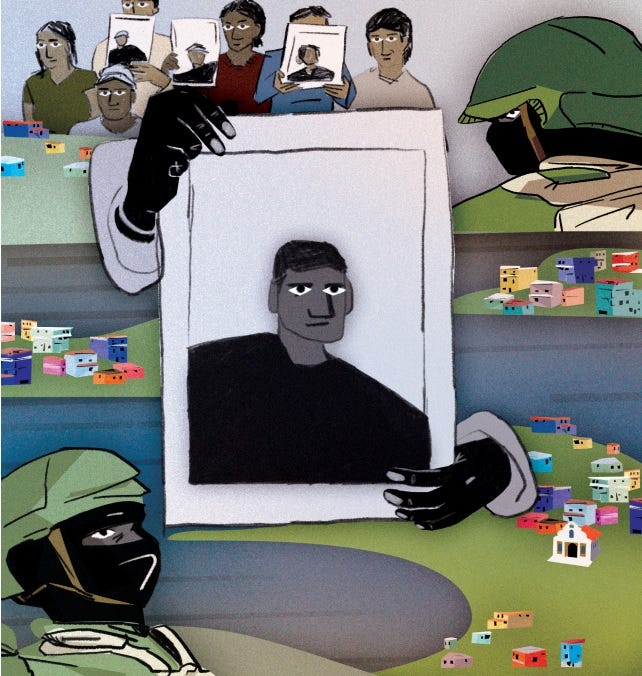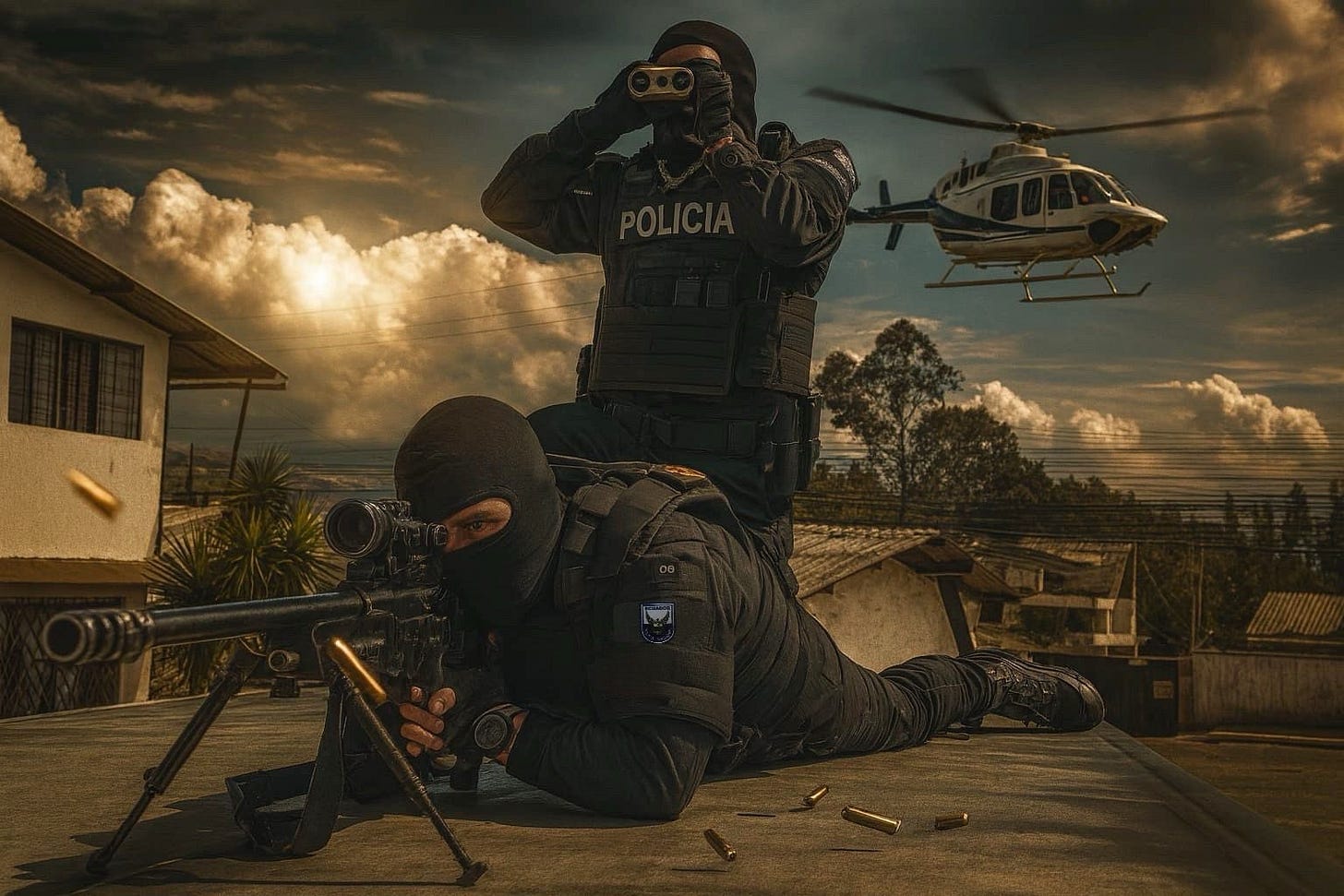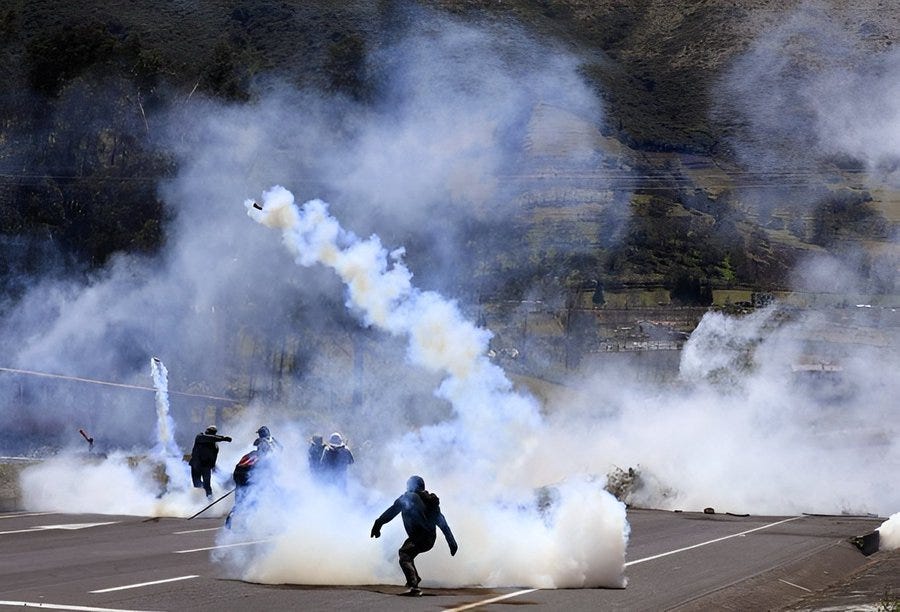Report accuses Ecuador of 'forced disappearances.' It couldn't come at a worse time for Noboa
National protests kicked off Monday and have spread to the capital as indigenous federation CONAIE calls for a national strike

As protests against the government of right-wing President Daniel Noboa gain steam in Ecuador, Amnesty International released a new report that accuses state forces of severe human rights abuses, including forced disappearances of civilians, as part of his “mano dura” (iron fist) security policies to combat rising crime.
“Continuing a pattern we have seen in El Salvador and Mexico, criminal violence has been replaced by state violence,” said Amnesty representatives in a press conference on Tuesday.
Naboa has made battling crime a central plank of his presidency and declared a “war” on criminal groups that has led to the abuse and even extrajudicial killings of Ecuadorian civilians.
The country has seen a dramatic rise in homicides in recent years alongside the explosive growth of organized crime groups and local gangs. Once the safest country in South America, it is now among the most dangerous in all of LATAM.
In a case that created outrage across the country, soldiers arbitrarily detained and tortured 4 Afro-Ecuadorian teenagers from Las Malvinas. Their charred bodies were found weeks after their disappearance. The soldiers charged in the case have denied killing the boys, claiming the children were released after security forces staged a “mock execution.”
Residents from Malvinas, however, have accused security forces of murdering the boys as well as broad civil rights violations against the community, including forced disappearances, arbitrary detentions, and invasive searches they say violate basic Constitutional rights.
Amnesty International denounces what they describe as systemic impunity of security forces for human rights abuses as part of their crackdowns against crime. The human rights organization documents 43 cases of forced disappearance since Naboa declared a “state of exception” over two years ago.
They believe that number is dramatically under-reported; however, many families fear retaliation by state forces for speaking out. Amnesty also suggested that some prosecutors, sympathetic to police and military, are stonewalling or even blocking investigations.
“Instead of investigating these cases, prosecutors have attacked us publicly,” said the family member of one missing person in Ecuador at the press conference. She described military members as espousing a philosophy of “as long as no one sees me do it, what I do is legal.”
“They have tried to criminalize us,” she continued, breaking into tears. “We are not criminals. We are searching for our loved ones.”
Amnesty representatives also criticized the United States for supporting police crackdowns in the country, both politically and economically. Noboa, a vocal supporter of US President Donald Trump, has been advocating for direct intervention by Washington, DC, in his country, including the deployment of US troops.
Meanwhile, Protests against Noboa are growing

The report comes at a delicate moment for Noboa, as protests across the country continue growing. Sparked initially by an end to diesel subsidies, protesters’ demands have also focused on violence committed by security forces, as well as Noboa’s attempt to replace the country’s Constitutional Court, which has restricted his ability to consolidate power as part of security crackdowns.
On Monday, indigenous federation CONAIE joined calls for a national strike and clashed with police in small cities across the country, especially in regions with large indigenous presences, and set up roadblocks on highways. Yesterday, indigenous activists staged marches in the capital, Quito.
“The government has forced us to take this decision by imposing crises in health and education, as well as violating the integrity of our territories,” said the organization’s President, Marlon Richard Vargas Santi, in a statement announcing the measures.

On Tuesday, as protests spread, Noboa tried to blame Venezuelan gang Tren de Aragua as the masterminds of national demonstrations that have at times clashed with police.
It is an absurd claim, likely made more for allies in Washington than the domestic audience.
So far, security forces have tried to present themselves as victorious against protesters, dismantling some roadblocks across the country and even trying to suggest that the protests are working for organized crime groups.
It is a strategy that worked for Bukele in El Salvador. But Bukele didn’t have to deal with a well-organized and highly motivated indigenous federation represented in Congress that has decades of experience resisting both left and right-wing oppression by security forces.
After all, as Daniel Noboa knows all too well, they have toppled presidents before.
Military police in Gonzalez Suarez, despite an APC and heavy riot equipment, are completely routed by indigenous protesters and flee in terror
If you are interested in analysis on the Ecuador protests through a completely different lens, you should check out yesterday’s bulletin from Latin America Risk Report. We love Boz, we read Boz. It’s why we recommend Boz on our homepage. We don’t, however, always agree with Boz.
But, at least speaking for myself (Joshua writing), he often provides context that I overlook. And if you have been reading us for any amount of time, you are probably aware that we love context. I strive to be professional and accurate in my coverage, but as a longtime former street-journo, I do have a slight bias towards burning shit down.
And Boz sometimes helps me see through that bias. He does make one indisputable point in the piece: CONAIE likely cares about the diesel subsidies more than any other issue. Protests in 2019, 2022, and 2023 were all disarmed after Quito took their abolition off the table.
That may well happen again. (I do, however, think he underestimates the effectiveness of roadblocks across the country. They may not be “made-for-TV” moments like clashes in Quito, but they disrupt trade and transport. And that hurts Quito. And CONAIE is excellent at that.)
You can also donate a one-time gift via “Buy Me a Coffee”. It only takes a few moments, and you can do so here.
And if you can’t do any of that, please do help us by sharing the piece! We don’t have billionaire PR teams either.



